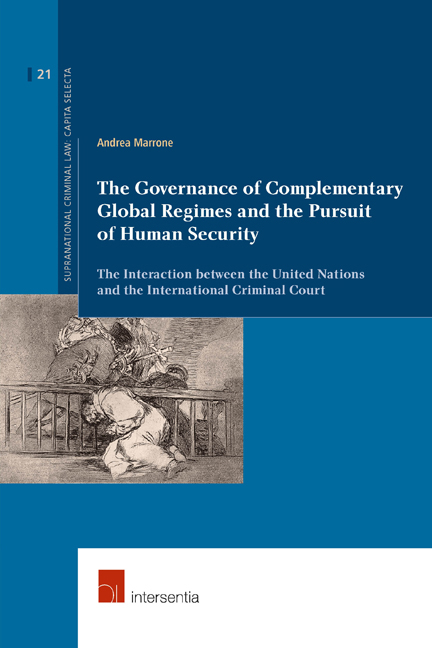 The Governance of Complementary Global Regimes and the Pursuit of Human Security
The Governance of Complementary Global Regimes and the Pursuit of Human Security from PART III - THE HUMANITARIAN ESCALATIONS OF LAST RESORT AND THEIR GOVERNANCE IN THE FIELD OPERATIONS
Published online by Cambridge University Press: 15 December 2017
“If you want to understand the causes that existed in the past, look at the results as they are manifested in the present and if you want to understand what results will be manifested in the future, look at the causes that exist in the present.”
The Writings of Nichiren Daishonin, The Opening of the Eyes, 1272, Part I, p. 279PRELIMINARY REMARKS
The meaning of complementary global regimes fostering peace, justice and security depends on the ways they are governed in accordance with humanitarian principles. The international governance institutions deriving from such regimes have to meet the highest standards of accountability, effectiveness and quality management, including cooperation and support between them in order to protect civilians. The presence of the International Criminal Court and the United Nations involved in the same situations is not characterized by an integrated model of governance. The practice of saving human lives and alleviating the sufferings of civilians in conflict situations requires political convergence of expectations of decision-makers. This study debates the global humanitarian policy to intervene in conflict situations and the preparedness of international governance institutions dealing with mass atrocity crimes and aggression, including their public authority, delimitation of competence and responsibility. It contributes to the contemporary visions for the preservation of the international legal and political order, including the capacity-building of the international community governing intra- and inter-state conflicts on the ground, much more than as distant observers, or with militarized international responses deriving from the ideology of hazardous solutions. The dilemma of human security requires further policy efforts and a political road map to promote the extention of international complementarity between both legal and political frameworks of governance of the international community. The policy formulation of interaction strategies between multilateral premises of universal character dealing with international threats and crimes deserves debate for several reasons. Their complementary character depends on the political forces involved in the preservation of law and order and is considered absolutely necessary.
In this study the search of a definition of complementary global regimes is advocated a) for further progress of a universal jurisdiction of the world community; b) for the evolution of international governance institutions centralizing fundamental individual rights; and c) for systemic changes in the prevention, response and reconstruction of situations of war and crime.
To save this book to your Kindle, first ensure [email protected] is added to your Approved Personal Document E-mail List under your Personal Document Settings on the Manage Your Content and Devices page of your Amazon account. Then enter the ‘name’ part of your Kindle email address below. Find out more about saving to your Kindle.
Note you can select to save to either the @free.kindle.com or @kindle.com variations. ‘@free.kindle.com’ emails are free but can only be saved to your device when it is connected to wi-fi. ‘@kindle.com’ emails can be delivered even when you are not connected to wi-fi, but note that service fees apply.
Find out more about the Kindle Personal Document Service.
To save content items to your account, please confirm that you agree to abide by our usage policies. If this is the first time you use this feature, you will be asked to authorise Cambridge Core to connect with your account. Find out more about saving content to Dropbox.
To save content items to your account, please confirm that you agree to abide by our usage policies. If this is the first time you use this feature, you will be asked to authorise Cambridge Core to connect with your account. Find out more about saving content to Google Drive.